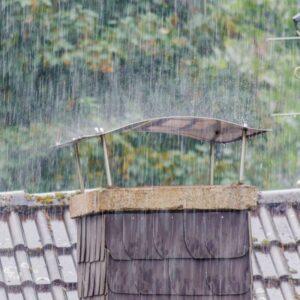If you’ve lived in the Southwest Missouri or Northwest Arkansas area for any amount of time, you know spring and summer rain showers are normal. In fact… not only are they normal, but we can get quite a bit of rain during those months. And while rain is awesome for our plants, it’s not always the best for your chimney.
We get a lot of questions about rain and leaky chimneys. If you’ve got yourself a leaky chimney, Ozark Stove and Chimney’s knowledgeable technicians can get you taken care of in no time.
What Causes a Chimney To Leak?
When it comes to chimney leaks, the rain itself is hardly ever the true cause. More than likely, the rain is getting in because you’ve got damage to some part of your chimney system. The most common types of this damage we see are:
 Gaps or cracks: Since your chimney is exposed to the elements year round, it’s normal for the mortar and bricks to deteriorate over time. This can lead to cracks and gaps that allow water to seep in when it rains.
Gaps or cracks: Since your chimney is exposed to the elements year round, it’s normal for the mortar and bricks to deteriorate over time. This can lead to cracks and gaps that allow water to seep in when it rains. - Chimney crown damage: Your chimney’s crown sits at the top of your chimney and serves as a protective covering. Its main job is to keep water out. …but if it gets damaged, it can’t exactly do its job well – which means water is likely to get in.
- Faulty flashing: Flashing is the metal stuff you see at the base of your chimney where it meets your roof. Its job is to keep water out, as well. If it’s installed wrong or has deteriorated over time, it can be the reason water makes its way into your chimney system and your home.
- Chimney cap damage: Chimney caps are designed to keep water and other debris from getting down into your chimney. If your cap is missing, damaged, or lacking a screen, you’re leaving your chimney open for a mess of issues, including water intrusion.
How To Prevent Chimney Leaks When It Rains
Prevention is key, right? We sure think so! We know it’s never fun to have to deal with a leaky chimney or the repairs that come with it… The best way to avoid being in that pickle is to take care of your chimney each year. We suggest the following types of maintenance:
- Annual Overviews: Every chimney should be inspected and swept annually. This allows our techs to spot any potential problems early on and address them accordingly.
- Waterproofing: We can apply a special repellant to your chimney that helps create an added barrier against water getting in.
- Replacing Damaged Parts: If your chimney has any damaged parts like the cap, crown, masonry, etc. having issues repaired is a must if you want to keep water out and avoid further damage.
Can I Fix My Leaky Chimney Myself?
So you just got done watching the latest episode of Fixer to Fabulous and think you’re ready to tackle your own chimney repair. Well… let’s pump the brakes for a minute.
 Trust us – we love a good DIY project as much as the next guy, but when it comes to chimneys, these are jobs best left to our professional technicians. We had a customer once who called in a panic after he attempted to repair the cracks in his chimney. He thought he could just spackle mortar over the problem areas and call it a day….he was sadly mistaken.
Trust us – we love a good DIY project as much as the next guy, but when it comes to chimneys, these are jobs best left to our professional technicians. We had a customer once who called in a panic after he attempted to repair the cracks in his chimney. He thought he could just spackle mortar over the problem areas and call it a day….he was sadly mistaken.
When it comes to chimney masonry repairs, you want to ensure the right materials, tools and procedures are used. Damaged masonry has to be chiseled and ground away to ensure a proper repair. Lucky for him, our awesome technicians were able to remedy the issue and get his chimney back in shape and protected from the elements in no time.
When it comes to all things chimney related, trust the professionals at Ozark Stove and Chimney to get the job done right, so you can focus that DIY attention on another area of your home.
Call Us at the First Sign of Trouble
If you see signs of a leak such as staining, water in the firebox, musty odors, discoloration of the outside masonry, liner damage, or a damper that won’t open, it’s time to call Ozark Stove and Chimney to take a look and see what the problem is.
Give us a call today at 417-201-6585 or book with us online now. Our friendly and professional staff is standing by, ready to help with all of your chimney needs.
